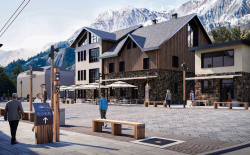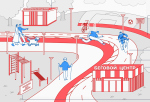04.03.2025
Genplan Institute of Moscow:
Back to Firm’s Profile
24.12.2024
Julia Tarabarina. A Paper Clip above the River
In this article, we talk with Vitaly Lutz from the Genplan Institute of Moscow about the design and unique features of the pedestrian bridge that now links the two banks of the Yauza River in the new cluster of Bauman Moscow State Technical University (MSTU). The bridge’s form and functionality – particularly the inclusion of an amphitheater suspended over the river – were conceived during the planning phase of the territory’s development. Typically, this approach is not standard practice, but the architects advocate for it, referring to this intermediate project phase as the “pre-AGR” stage (AGR stands for Architectural and Urban Planning Approval). Such a practice, they argue, helps define key parameters of future projects and bridge the gap between urban planning and architectural design.16.12.2024
Julia Tarabarina. Competition: The Price of Creativity?
Any day now, we’re expecting the results of a competition held by the “Samolet” development group for a plot in Kommunarka. In the meantime, we share the impressions of Editor-in-Chief Julia Tarabarina, who managed to conduct a public talk. Though technically focused on the interaction between developers and architects, the public talk turned into a discussion about the pros and cons of architectural competitions.25.11.2024
Julia Tarabarina. Four Different Surveys
The “Explore the City” competition, organized this year by the Genplan Institute of Moscow, stands out as a pretty unconventional one for the architectural field but aligns perfectly well with the character of urban planning work. The winning project analyzed contemporary residential complexes, combining urban planning insights with a realtor’s perspective to propose a hybrid approach. Other entries explored public centers, motivations for car ownership, and housing vacancy rates. A fifth participant withdrew. Here’s a closer look at the four completed works.17.06.2024
Julia Tarabarina. The Runner’s City
The Genplan Institute of Moscow, in collaboration with MosComArchitectura, proposes a new level of connectivity or, better yet, “awareness” for urban improvement projects. Its specialists have developed a network of cycling, running, and pedestrian routes organized like a human circulatory system: there are major “veins” and fine “capillaries” in it. Every single house is no more than a kilometer away from a segment of this network. The network takes into account existing implementations and projects, and suggests adjustments based on its comprehensive program. In New Moscow, this network introduces a smart inversion motivated by the area’s unique features.11.06.2024
Julia Tarabarina. Campus within a Day
In this article, we talk about what the participants of Genplan Institute of Moscow’s hackathon were doing at the MosComArchitecture booth at the “ArchMoscow” exhibition. We also discuss who won the prize and why, and what can be done with the territory of a small university on the outskirts of Moscow.17.11.2023
Julia Tarabarina. The Cemetery: Inside and Outside
The workshop organized by the Genplan Institute of Moscow scored one of the two first places at the “Open City” festival. Its subject is reorganization of municipal cemeteries. Two action plans were proposed, diametrically opposite: one for the downtown and one for the suburbs.12.10.2023
Julia Tarabarina. From Moscow to Khabarovsk
This year, the works submitted by the students of the Genplan Institute of Moscow included a proposal for revitalizing Moscow’s “Pravda” complex with its structures designed by Ilia Golosov, landscaping an East Siberian town, located a 12-hour drive away from the nearest big city, and three versions of turning a derelict “pioneer camp” into an educational hub, similar to “Sirius”. Two sites out of three have an interested client, so chances are that the students’ works will be ultimately implemented.09.10.2023
Alyona Kuznetsova. Harmonization of Intentions
We met and talked with the chief architect of Genplan Institute of Moscow Grigory Mustafin and the chief architect of Yuzhno-Sakhalinsk Maxim Efanov – about how the master plan of the city is formed. The key to success: gathering data, digital simulation, working with the city people, thinking infrastructure, and presentation.03.07.2023









